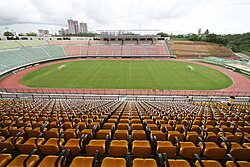Estádio Governador Roberto Santos, usually known as Estádio de Pituaçu, is a football stadium located in Salvador, Bahia state, Brazil. The stadium is owned by the Government of Bahia state and it was built in 1979.[1] Its formal name honors Roberto Santos, who was a federal deputy, the governor of Bahia state from 1975 to 1979, a professor at the Universidade Federal da Bahia's Faculty of Medicine, and was the Minister of Health during José Sarney's government.[2] The stadium became one of the most important stadiums in Bahia after the Fonte Nova stadium's demolition was announced, and it has a maximum capacity of 32,157 people,[3] but it will be expanded to a maximum capacity of 34,000 people.[4] It is Esporte Clube Bahia's home stadium during the building of the Arena Fonte Nova.
Estádio de Pituaçu | |
 | |
 | |
| Location | Salvador, Brazil |
|---|---|
| Owner | State of Bahia |
| Capacity | 32,157[3] |
| Field size | 110 x 68m |
| Surface | Grass |
| Construction | |
| Opened | 1979 |
| Renovated | 2009 |
| Tenants | |
| Esporte Clube Bahia[1][2][3][4] | |
History
editThe stadium construction concluded in 1979. The inaugural match was played on March 11 of that year, when Bahia beat Fluminense de Feira 2-0. The first goal of the stadium was scored by Bahia's Douglas.[1]
The stadium's attendance record currently stands at 18,418, set on April 2, 1995, when Vitória beat Bahia 2-0.[1]
On January 21, 2008, the stadium reformation started. It was planned to be concluded in August of the same year,[5] but it was delayed to October[6] due to a workers' strike.[5] The first official game of the new stadium occurred on January 25, 2009, with Bahia defeating Ipitanga 4-0.[7] Its maximum capacity will be expanded to 34,000 people,[4] and it will be adapted to be in accordance with the Brazilian Supporters' Statute (Estatuto do Torcedor).[8]
Estádio de Pituaçu hosted the 2010 World Cup Qualifying game between Brazil and Chile, played on September 9, 2009, and won by the Brazilians 4-2.[9]
References
edit- ^ a b c d "Estádio Metropolitano Roberto Santos" (in Portuguese). Templos do Futebol. Retrieved January 12, 2008.
- ^ a b Enciclopédia do Futebol Brasileiro, Volume 2 - Lance, Rio de Janeiro: Aretê Editorial S/A, 2001.
- ^ a b c "CNEF - Cadastro Nacional de Estádios de Futebol" (PDF) (in Portuguese). CBF. August 14, 2009. Archived from the original (PDF) on May 10, 2013. Retrieved September 11, 2009.
- ^ a b c "Governo anuncia estádio para o Bahia a partir de agosto" (in Portuguese). UOL Esporte. Retrieved January 12, 2008.
- ^ a b "Estádio de Pituaçu não ficará mais pronto em agosto" (in Portuguese). Jornal da Mídia. May 26, 2008. Retrieved September 3, 2008.
- ^ "Estádio de Pituaçu só vai ficar pronto em outubro" (in Portuguese). Jornal da Mídia. July 7, 2008. Retrieved September 3, 2008.
- ^ "Na reinauguração de Pituaçu, Bahia goleia Ipitanga" (in Portuguese). A Tarde. January 25, 2009. Retrieved July 15, 2011.
- ^ "Obras em Pituaçu devem acabar em maio de 2008" (in Portuguese). Globo Online. Retrieved January 12, 2008.
- ^ "Nilmar brilha, reservas dão conta do recado e Brasil bate freguês Chile: 4 a 2" (in Portuguese). UOL Esporte. September 9, 2009. Retrieved September 11, 2009.